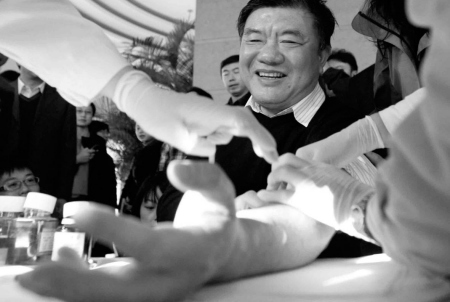Health minister donates blood to address blood shortage
Chinese Health Minister Chen Zhu donated blood on Friday in Beijing and called on health workers to take the lead in blood donation, in a move to ease the country's blood supply shortage.
|
|
Along with Chen, nearly 500 ministry and hospital workers also donated blood, one day after the Chinese Red Cross Society made an urgent appeal for donations.
"Donating blood is the responsibility and obligation of every healthy citizen of the right age," said Chen.
The minister assured the public that proper blood donations are not harmful to their health.
Also on Friday, the municipal government of Changchun, capital of northeast China's Jilin province, mobilized students and staff at 37 universities and colleges to donate blood. Additionally, the local government plans to mobilize servicemen and government employees to donate.
Hospitals in Beijing and the provinces of Shandong, Shanxi, Jiangxi and Yunnan are suffering from acute blood shortages, causing the delay of some surgical procedures.
In Kunming, capital of Yunnan Province, for example, there is less than 20,000 cc of blood supplies left, far less than the normal amount of 400,000 to 500,000 cc.
All surgeries requiring blood transfusions of more than 600 cc have been postponed unless it is an emergency, Yang Tonghan, director of the Kunming blood center said.
Fewer people donate blood when the weather turns cold, according to blood center workers. Still, the current shortage is the most severe in recent years.
Chinese demand for clinical blood has grown 10-15 percent annually in recent years, according to statistics from the Health Ministry.
However, only 84 out of every 10,000 people donate blood in China, far less than the 454 out of every 10,000 people in high-income countries and 101 in middle-income countries.
"It is an arduous, long-term task to effectively organize blood donations and ensure blood supplies," the Health Ministry said in a press release.
In response to media reports which say blood-collecting centers sell donated blood to hospitals for a profit, Chen Zhu said, "It is a misunderstanding."
The centers' sales are just meant to cover the cost of packaging, testing, storage and transportation, Chen said. "The blood itself is free of charge."
The minister said that the main source of donated blood in China was college students and migrant workers, which accounted for 60 percent of total donors, while only 40 percent was provided by local residents.
Chen Zhu's high-profile example on Friday was expected to encourage people who had been scared by reports of HIV infection through blood donations in the countryside in some provinces in the 1990s.
Some rural people in Henan and other provinces sold their blood and became infected by the AIDS virus after they went to unlicensed blood-collecting centers. The horrifying reports deterred many urban citizens from willingly donating blood.
The minister said that citizens now had no need to worry about the safety of licensed blood-collecting centers and stressed that their health, after donating 200-400 cc of blood each time, would not be harmed.
The Health Ministry had taken various measures to provide a safe environment for blood donors in the past 10 years and had strengthened supervision of all medical instruments used in collecting a donor's blood, Chen said.
China's Blood Donation Law was enacted in 1998. It says the state shall encourage citizens between the age of 18 and 55 to donate blood.
More than 11 million people donated blood in China last year, according to the Health Ministry.
 0
0 








Go to Forum >>0 Comments